New Voices of 2010
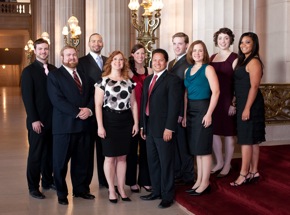
The people whose contributions are making the Merola Opera Program possible had two coveted opportunities over the weekend to see and hear the entire Class of 2010.
Donors were eager to see who among the 20 young singers, training and performing here from June 14 through Aug. 21, will be a future Patricia Racette, Thomas Hampson, Deborah Voigt, Susan Graham, Joyce DiDonato, Mark Delavan, or any other of today's stars who started with the program as young unknowns. There are also five apprentice coaches and directors in this year's program.
The Merola Program was born in 1954 as the San Francisco Opera Memorial Fund, incorporated as a separate organization in 1955; then two years later, General Director Kurt Herbert Adler named it for his predecessor, founding director Gaetano Merola. The $2 million annual training program has been funded separately from the Opera, although with the parent organization's full logistical support — and over $1 million a year from Merola to SFO as an "independent contractor" for facilities and services.
Merola pays all tuition, housing, and travel expenses for participants, as well as granting them a living stipend during the 10-week intensive training. The number of Merola supporters has risen from 677 to 718 members in the past year, providing the lion's share of Merola's annual budget.
The two events were the Friday "Meet the Merolini" in the War Memorial's Green Room, and the Sunday General Director's Auditions in the Opera House, featuring the new Merolini singing for David Gockley, Music Director Nicola Luisotti, and members of the music staff, who will eventually decide which singer will "graduate" to the prestigious Adler Fellowship, and what roles they may be offered in main stage productions.
On Friday, the Merolini were introduced and interviewed briefly by Board Chair Jayne Davis, President Patrick Wilken, and Opera Center General Director Sheri Greenawald. With impressive presence of mind and with good humor, the young artists "performed" well, even without singing.
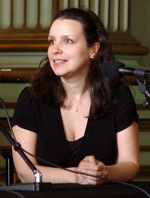
They come from around the globe, from different backgrounds, but with similar determination to succeed in this most demanding of genres. Unlike in the past when Merolini were coming as "unknowns," today's young artists already have some important accomplishments in their resumes.
Soprano Nadine Sierra, from Florida, is a Metropolitan National Council Audition Finals winner; Moscow-born Valentina Fleer is a Sara Tucker Award winner, already engaged to sing a major role with the Los Angeles Opera.
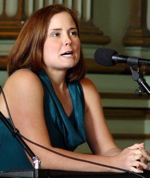
Besides Fleer, there is another Russian in the group: apprentice coach Natalia Katyukova, trained both in Moscow and at Juilliard.
To illustrate the complications of the program's international logistics, baritone Ao Li, of Shangdong, China, is still making his way to San Francisco, already a couple of weeks late. Program administrators are doing their best and hope for a happy ending to the holdup.
Mezzo Robin Flynn, from Orlando, Fl., has studied at Mannes, CUNY, and with Opera New Jersey. Iowan mezzo Renée Rapier lists "large and gaudy accessories" as a matter of interest, but she wore none at the event.
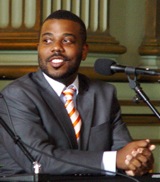
Tenor Eleazar Rodriguez was born in Mexico, but he is a San Francisco Conservatory graduate, a popular performer locally, and in his second year in Merola. Soprano Rebecca Davis may be familiar to Bay Area audiences: She was principal artist in residence with Opera San José.
Besides Rodriguez, there are three other tenors in the program, an unusually high number: Alexander Lewis comes from Australia; Daniel Montenegro is from Santa Ana, Ca.; Kevin Ray hails from Cornwall, N.Y.
From Canada come baritone Benjamin Covey, a student of Tracy Dahl, herself a Merolina; apprentice coaches Jenna Douglas and Michael Spassov. David Hanlon, another apprentice coach, is from Arlington, Va.; he has worked with the Houston Grand Opera Studio. Apprentice stage director Ted Huffman, from Connecticut, has studied with Robert Wilson, and directed numerous productions.
Baritone Sidney Outlaw and bass Kevin Thompson both won in a Florida Grand Opera competition; Thompson's background includes the Juilliard, Aspen, and a year in Austria. Soprano Hye Jung Lee, from Seoul, won last year's Career Bridge Competition.
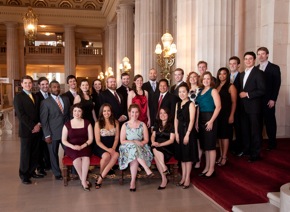
Soprano Janai Brugger, from Chicago, will be among those newcomers participating in a Schwabacher Summer Concert. Mezzo Colleen Brooks, from Wisconsin, has a recital scheduled in the fall with the Civic Music Association back home.
Abigail Santos Villalobos may be the first singer in Merola from Puerto Rico; the soprano has studied in Cincinnati, and with the Oberlin program in Italy.
Baritone Dan Kempson, from Connecticut, will sing the title role in the Merola production of The Barber of Seville. Bass-baritones Thomas Florio and Ryan Kuster come from Manassas, Va., and Jacksonville, Il., respectively. Kuster has appeared with numerous opera companies already.
Public performances by Merolini include the Schwabacher Summer Concert at Herbst Theatre on July 16, and (free) at Yerba Buena Gardens on July 25; Donizetti's The Elixir of Love at Cowell Theater, Aug. 5-8; the Merola Grand Finale in the Opera House on Aug. 21.
'New Frequencies'
They call it an "underground summer music series," but according to reliable information, New Frequencies will take place in the Yerba Buena Center for the Arts Forum and Sculpture Garden — solidly above terra firma.
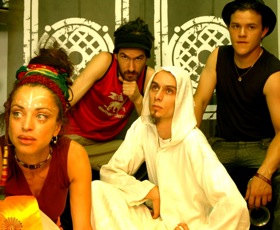
With the participation of X (say "Equis") Alfonso, Osamu and Pedro Calvo, Jewlia Eisenberg and Charming Hostess, Watcha Clan, Ben Goldberg, and Myra Melford; Kinan Azmeh and Dinuk Wijeratne; and the Estamos Ensemble, concerts run July 6 through Aug. 2. If you want to visit the Yerba Buena galleries, go earlier in the day because those close at 8 p.m.
If you don't know much about New Frequencies (welcome to the club), it's said to feature "creative, genre-bending music from around the globe, featuring both emerging and world-class musicians in exciting pairings and collaborations."
What's new this year is the addition of the Sculpture Court as a venue. It's the setting for a new music installation by composer Jewlia Eisenberg.
"This is a summertime series," says New Frequencies curator Isabel Yrigoyen, "so we also want folks to have fun, and to create spaces for interactivity — whether it be dancing, or interacting with a site specific music installation, or simply enjoying a concert. Each event will have its own vibe, and draw from the diversity of this region with a global perspective." Woodstock West plus four decades?
More contemporary and passively enjoying the vibes is the Watcha Clan, a group from Marseilles with Arab and electronic influences. It is said to be among the more exciting bands on the world music circuit. Their "controlled chaos" sound switches from Balkan, to Brooklyn, to Egyptian, to Moroccan and Sufi.
Yes, Virginia, There Is Music on NPR
In San Francisco, you have to go back a long way to remember when KQED-FM broadcast classical music. A very long way. But not all of National Public Radio is like that. If you go to NPR Music, you get music programming from NPR shows and individual public radio stations across the country (excepting KQED).
There are World of Opera and All Songs Considered, for starters.
A Mature Napa Valley Symphony: Season 78
Napa Valley Symphony's next season, a remarkable 78th, will be shared by seven guest conductors in Lincoln Theater: JoAnn Falletta is first, on Sept. 19, with Orion Weiss as soloist; Kazem Abdullah follows on Nov. 14, with soprano Marnie Breckenridge as soloist.
The third guest conductor of the season is violinist Dmitry Sitkovetsky, who will also appear as soloist in the Mozart Violin Concerto No. 3, on Jan. 30. Joel Smirnoff is the conductor at the March 27 concert, with pianist Navah Perlman as soloist. Heiko Mathias Förster leads the May 15 concert, with violinist Chloë Hanslip.
Two special vocal concerts are scheduled, the first on Dec. 12, with San Francisco Symphony Chorus Director Ragnar Bohlin directing the Symphony, the Napa Valley Chorale, and the St. Helena Chamber Singers in Handel's Messiah.
On April 17 San Francisco Opera Center Resident Conductor Mark Morash leads Adler Fellows in a concert of opera highlights.
Salkind Piano Duo Festival
The third annual Milton and Peggy Salkind International Piano Duo Festival will take place July 8-10 at the San Francisco Conservatory of Music. There are seven programs performed by visiting and local piano duos, plus the Salkind Junior Festival of public master classes, seminars, and workshops for musicians grades 6-12.
Participants this year come from Canada, Italy, Argentina, Venezuela, Latvia, and the U.S. A special feature of the festival is a showcase for "American Masterpieces," compositions from both North and South America for duo piano.
Ladies With Internal Amplification
How great is it to have two great youngish singers in town, singing in virtual harmony, right next door to each other.
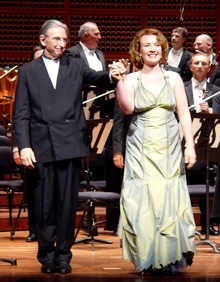
Sasha Cooke's Les Nuits d'été at last week's San Francisco Symphony matinee was not only magnificent, but it also served as a kind of echo to what we've been hearing in the San Francisco Opera Die Walküre, across the street — Eva-Maria Westbroek's sensational Sieglinde. ("Her liquid, lyrical soprano was for me the vocal discovery of the season," writes David Littlejohn in The Wall Street Journal, and yet the qualities of the voice go far beyond those adjectives.)
Two very different works, of course, in two different hands (MTT's shimmering Berlioz versus Runnicles' evenly, irresistibly flowing Wagner), and two different fachs — and yet something is closely connecting the two singers.
Both have voices that fill enormous houses (Davies Symphony Hall and the War Memorial), permeating every nook and cranny with ease. The quality of their voices, their "power-legato," and absolutely top-notch projection must be heard to be appreciated ... or even understood.
These are not Birgit Nilsson-huge voices, not something imposed, but coming from an inner microphone amplifying the sound, even while preserving subtle passages. (In Davies, there were questions about amplification, but — having heard Cooke elsewhere — I am fairly certain it was all her, and no electronics.)
Also, Westbroek and Cooke are "natural" in singing, in appearance. If you heard live performances by Frederica von Stade, Thomas Quasthoff, and Lorraine Hunt Lieberson, you know what I mean. Nothing posed, nothing artificial, just stand, deliver, stun, and wow.
The variety of Cooke's interpretation of those very different songs was exceptional. The voice and the singer — both were transformed from Le Spectre de la rose, to Absence to Clair de lune.
Was everything "perfect"? Yes, with one exception. Cooke's dress was just so ... wrong. But when I opened my eyes again, I saw such involvement on her face with the music and the text that I had to put up with the dress.
Delavan Ascends to Valhalla
Whatever the future may bring for Mark Delavan, he can be assured of an accomplished fact. On Friday, he sang a uniquely magnificent Wotan in the San Francisco Die Walküre. And he did it the hard way.
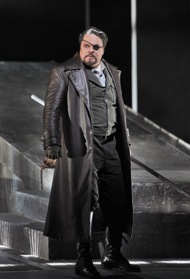
The reason for Walküre being the most popular of the Ring operas is its "big numbers." Among them: the Act 1 love duet, the Death Announcement, the Ride of the (often annoying) Valkyries, and a peak perhaps in all opera, the Magic Fire.
Wotan's Act 2 narration, some 20 minutes of recapitulation (and foretelling), is not part of the hit parade. And yet, it was the highlight of a brilliant evening.
Hard as it may be for the baritone to score in the "Magic Fire," at least he has the setting for dramatic and musical success. In the narration, it's a kind of recitative, the transmission of information, with small (but meaningful) musical fragments from the orchestra.
Delavan transformed that into a gripping, moving scene of gorgeous bel canto singing. Musically lyrical, dramatically convincing, this was a Wotan making the audience sit up, listen, experience the all-too-human tragedy of a god. Diction and projection were superb, and yet the parts of the performance didn't matter — it was the impact of the whole that was extraordinary. The singer was "in the zone," and everything was exactly right.
Although there were some cell phones ringing earlier, a chit-chat here, a few coughs there, near the end of the 90-minute act, I suddenly became aware of deep, receptive, responsive silence from some 3,000 people. To a very large extent, it was Delavan's doing.
He was in spectacular company. Donald Runnicles' musical leadership was at its most generous and effective. He allowed voices to dominate (and Christopher Ventris' lyrical, but emphatically not heldentenor Siegmund needed the help), and yet nothing was lost from the luxurious orchestral score. Francesca Zambello's stage direction is responsible for one of the best-acted, believable productions in my experience.
Nina Stemme, fighting a bug for a week now, had a couple of near-strangled high notes at the beginning, but then went on from good to great, singing and acting with the best of Brünnhildes. Eva-Maria Westbroek's Sieglinde is a treasure. Two singers receiving mixed reviews in the past, Janina Baechle (Fricka) and, Raymond Aceto (Hunding) gave exceptional performances.
And yet, the overwhelming memory of the evening was Delavan's Wotan, narrating, saying things even to Wagnerian veterans they never heard fully before.
Word to the wise and all others: There is only one performance left, on Wednesday. That's tomorrow.
